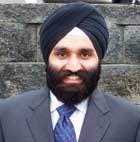The Wal-Mart greeter
by Dr. Michael Gradeless
When I interview highly successful new dentists for Dental Economics®, I always see multiple reasons for each dentist’s success. Dr. Princy Rekhi was intelligent and extremely motivated. But when he described the circumstance in which he embraced the role of a Wal-Mart greeter for his practice, I knew I must share his story. We all face challenges. Regardless of our advantages, our resilience determines our success. Enjoy Dr. Rekhi’s story.
Dr. Gradeless: First, give us an overview of your practice and background.
Dr. Rekhi: I own two offices, and am in the process of building a third from scratch. I purchased my first office in October 2003. I am now 27 years old. I grew up in Seattle, Wash., and attended the University of Missouri at Kansas City School of Dentistry from 1997 to 2003. I graduated valedictorian of my high school class, and was accepted into a fast-track, six-year BA/DDS program. I graduated in May 2003, and began my practice years as an associate. This lasted for about four months. I then purchased my first office from a retiring doctor. The most challenging aspect of the transition was staff relationships. I don’t know if I have mastered that yet, but I am continually working to improve in this area. On the second day in my new practice, the assistant never returned from lunch. This was only the beginning. Within three months, the remainder of the staff was gone. The assistant departed because I prevented her from scaling a patient. Assistants cannot legally scale in our state. This incident was indicative of how my vision was different than that of the doctor selling the practice. I believe that the most important part of a dental office is a precise, efficient, knowledgeable, and - most importantly - friendly staff. This vision was not shared by the previous doctor. After approximately one year in practice, I became adept at hiring employees. The practice was going well. I thought it was time to expand so I acquired a second office and medical suite from another retiring doctor. The second transition was much smoother than the first, mainly because the staff was long-term and happy with the sale of the practice. Little did I know that I would soon face an even greater challenge than staff turnover. Both of my practices were purchased from practice brokers. Although the brokers were of no use to me, this procedure was necessary since they had the listings for the practices I was interested in purchasing.
Dr. Gradeless: Tell us how your practice supports your vision. What are your long-term goals? Describe your target market and procedure mix. What did you need to learn after graduation to support your success? Beyond making a living, what makes you excited to go to work every day?
Dr. Rekhi: My practice supports my vision because we are constantly working on ways to better patient care and provide the best quality of care available. We strive to make everything perfect. If it’s not, we stand behind our work to make sure our patients are satisfied with the end result. We work hard until they are satisfied. The target market is family dentistry. I am not interested in working to impress the top 1 percent of society. That is too much stress for me. I am more interested in providing complete general dentistry to regular people. The biggest things I had to learn after dental school were communication and business skills. Learning to spend money that you don’t have is key. It takes money to make money was never more true. When I first started, I had a lot of debt. I saved nothing. After purchasing my first practice, I learned that I needed to spend money to advertise, market, and reach out to patients. In turn, this would lead to a profitable venture by attracting patients to my office. I am excited to go to work every day because of the staff members I work with and the patients I treat. Every patient is unique and has his or her story. This makes every day a unique and interesting experience .
Dr. Gradeless: Tell us about strategic planning. Do you have an annual plan? What statistics do you track? Are you phasing employee hiring, equipment purchases, and business expansion? How do benchmarks influence or indicate your professional growth?
Dr. Rekhi: I don’t have an annual plan; I am a very “non-conventional” doctor. I am spontaneous and play it day by day in terms of how I wish to improve the office. I wish I could say employee hiring has been phased, but it has not. We hire as needed; we don’t fire. Equipment purchases are made strategically in order of importance. We try to bring multiple facets of new technology into the office without acquiring debt. So we buy what we can afford. Business expansion is automatic. Once the office is doing well, it’s only a matter of time before I am thirsty for another challenge. Benchmarks that indicate professional growth for me are personal rather than financial or professional. When a patient refers a family member, or a staff member brings in family, I regard this as professional growth. The ultimate measure of your professionalism is the referral of patients.
Dr. Gradeless: Scheduling, marketing, new-patient exams, operations, financial arrangements, and continuing care are important systems in a practice. Which systems are most important in your practice and have helped your success? What are the areas in which you particularly excel?
Dr. Rekhi: I think there is no one area in which I excel. I work hard to continually improve all areas of the practice. Monthly, we visit our goals for scheduling with the scheduling coordinator. We work on marketing as a unit. New- patient exams are always geared toward getting to know the patient. At this point, our office is stable enough so that we aren’t the bank. But we do allow patients to choose payment plans from within the office rather than via a third-party vendor.
Dr. Gradeless: Leadership is the art of influencing others to help us achieve success. Tell us how others have helped you get where you are. What have you learned about managing a staff? Do you have any pointers on leadership?
Dr. Rekhi: Leadership is the key to success in dentistry. You are the leader of your work force. I find it best to lead by example. There is no task in the office I won’t do. I consider my staff my family and me a member of the team. If the office is running behind, I can be seen emptying the trash, vacuuming or tearing down/setting up an operatory. The number one thing is to be humble, and treat the staff like you want to be treated. They are all humans, not machines. They come to work because they want to, not because they have to. There are plenty of other jobs out there.
Dr. Gradeless: If you could give one piece of advice to another new dentist, what would it be? Also, please summarize what you think are the most important points.
Dr. Rekhi: The number one piece of advice that I would give a new dentist is to be patient and work hard. Honesty goes a long way. I think it’s important to realize that dentistry is a career and not a race. Things in dentistry take time to mature. It’s like planting a seed and watching it grow. Eventually, the seed will blossom and you can reap its rewards.
Dr. Gradeless: I must confess that I have altered one of Dr. Rekhi’s answers. His original interview did not include the information that his entire staff left shortly after he purchased his first practice. With his permission, I inserted this information into his first answer. His interview answers also did not include the information I believe holds the secret to his success. Three days after Dr. Rekhi purchased his second practice, he was involved in a rollover auto accident. This accident left him unable to lift a handpiece. In Dr. Rekhi’s words, “I got busy and hired an associate and knew that the only thing I could do for my practice was to be the Wal-Mart greeter and let my patients know that I was still involved.”
Webster’s Dictionary defines resilience as the ability to recover strength quickly. It is easy for most of us to look at someone’s success and think it was somehow easy. There has been nothing easy about the success that Dr. Princy Rekhi has achieved. When he was deep in debt, he borrowed more money. When confronted with staff turnover, he learned how to interview and hire new staff members. When confronted with physical disability, he decided to support his practice in the only way he could. While you will probably never experience challenges as great as Dr. Rekhi’s, it is comforting to know that dentistry can provide you with the opportunity to achieve great success quickly.Dr. Princy S. Rekhi is a 2003 graduate from the University of Missouri-Kansas City School of Dentistry where he earned a bachelor’s degree in biology and a DDS in six years. Contact Dr. Rekhi via e-mail at [email protected].
Dr. Michael Gradeless, a 1980 graduate of Indiana University, practices preventive dentistry in Indianapolis with an emphasis on cosmetics and implants. He is an adjunct faculty member at Indiana University, where he teaches the Pride Institute university curriculum of dental management. He also is the editor for the Indiana Dental Association. Contact him at (317) 841-3130 or e-mail to [email protected].

